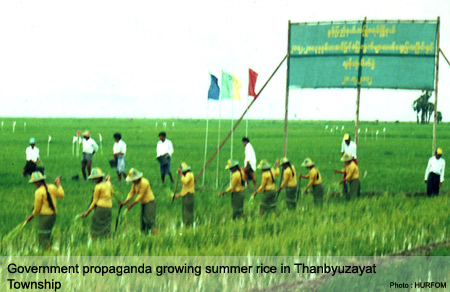Farmers ordered to grow doomed rice during next year’s hot season
September 26, 2008
 HURFOM : Mudon Township authorities have ordered farmers to grow summer rice crops, in spite of the season’s unsuitability to rice cultivation.
HURFOM : Mudon Township authorities have ordered farmers to grow summer rice crops, in spite of the season’s unsuitability to rice cultivation.
The order, given in a September 25th meeting between township authorities and village headmen, applies to Mudon Township’s twelve village tracts, each home to at least twenty-six villages. Farmers will be required to grow rice during the summer hot season, even though the weather is not conducive to rice cultivation. “Last year we had to grow summer paddy like they want us to do again. It did not work because the weather is no good for rice. We also had to buy everything even though it is their idea – the seeds, fertilizer and water,” said a farmer from Mudon Township. “We were not allowed to use our native seeds, the Myanmar Agriculture Service (MAS) only allowed us to use their seeds. But their seeds are not good or suitable for our land, and they are more expensive.”
Another farmer from Mudon echoed these sentiments. “Last year, the government agriculture survive ordered us to grow summer crops like this and we had to buy expensive fertilizer and expensive seeds. The seeds are not suitable for our land, do not produce good yields and need more fertilizer and water. The government agriculture service also does not give use enough water, so we had to buy more from the agriculture services. But even that was not enough. So we grew their summer crop, and we lost money.”
“If the farmers in the village tracts don’t want to grow summer rice, they will be punished,” said Min Aye Maung, the township’s manager of the Myanmar Agriculture Service, during the meeting with village headmen. “If they do not comply, I will give their land to the other people who will grow the rice,” he added, issuing a threat that will have significant impact on farmers who need to grow summer crops like ground nut and soy beans. “If you fail to implement this program, you will also be punished,” U Kyaw Kyaw Maung, Mudon’s township chairman, added in a threat to the headmen.
The order to grow summer rice is a continuation Burma’s decades old “two crops policy,” which begun in 1962. The program, which was started at the behest of then top general Ne Win, was designed to increase Burma’s flagging rice production. In 2002, the policy became mandatory in parts of Mon State, and farmers began being forced to cultivate summer rice. The program has been, by most measures, an utter disaster in Mon State. Rice production has failed to increase, while farmers have become mired in debt cycles; summer crops lose money, which thin rainy season profit margins can not always pay for.
Beyond debt, the two-crop policy has lead to much cynicism among farmers and residents of Mon State. “U Kyaw Kyaw Maung is about to transfer to another province,” said one farmer. “He just wants to build a big image for himself so he is seen as a powerful man from Mudon.” Other farmers suspect political motivations. “The government wants farmers to work all the time, whether the farmers get profits or not,” said another farmer from Mudon, interviewed before last year’s hot season. “They do not care about the farmers. They only want us to work so that we do not have free time. Free time means time to talk and organize. That is what the government fears.”
Comments
Got something to say?
You must be logged in to post a comment.



















































